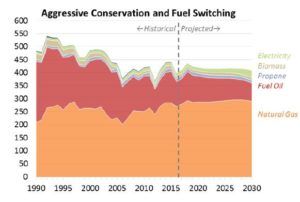Last week, the Massachusetts Department of Energy Resources released its Comprehensive Energy Plan. It's a generally solid piece of work, even if it doesn't say anything hugely surprising. Its various policy recommendations can be summarized fairly easily: electrify and conserve.
The first recommendation is nicely illustrated by this pie chart from the CEP. In 2016, only 17% of Massachusetts' energy demand of 1,074 trillion BTUs was from the electric sector. Transportation uses 44% of our energy and buildings (referred to in the report as "thermal") use 39%.

My clients in the electric generation sector have long noted that we're never going to meet our long-term GHG-reduction objectives without addressing transportation emissions. The CEP leaves most of the transportation recommendations to the report released Friday by the grandly-named Commission on the Future of Transportation. With respect to energy use, the Commission made what seem to me to be three key recommendations:
- Improve electric charging infrastructure
- Establish a "goal" to require all new cars, light duty trucks, and buses sold in Massachusetts beginning in 2040 to be electric or have an equivalent emissions profile
- Establish a RGGI for transportation system with the other Northeast and Mid-Atlantic states
Sounds easy.
How about buildings? It's time now to realize that efforts to decarbonize buildings can't be far behind, particularly since buildings are long-lived capital assets. In fact, one of the most interesting statistics provided in the CEP was that:
Even with aggressive fuel switching, 93 percent of the thermal sector consumption is forecast to be met through fossil fuels in 2030.

In other words, under any scenario, the thermal load from buildings is going to be met almost entirely by fossil fuels, at least through 2030, so we better reduce the load. Thus the focus on conservation as well as electrification. This helps to explain the 81 separate references to heat pumps in the CEP.
The big take-away? Time to get to work.
To view Foley Hoag's Law and the Environment Blog please click here
The content of this article is intended to provide a general guide to the subject matter. Specialist advice should be sought about your specific circumstances.

